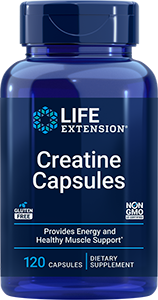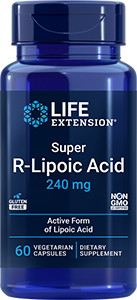
Newsletter
Newsletter
Long-Term Resveratrol Use Associated With Improved Cognitive Function, Brain Blood Flow

A study of patients with carotid artery stenosis or occlusion—narrowing or blockage of the carotid arteries that supply blood to the brain—found improved cognition, including memory, as well as increased blood flow to the brain among those who were administered oral resveratrol. This antioxidant is most famous for its presence in red wine (and grapes), but it also occurs in blueberries and peanuts.1
Compared with those who did not receive resveratrol, the resveratrol group also experienced significant decreases in systolic blood pressure and blood glucose. The findings were reported on January 30, 2024, in the Journal of Stroke.
“Long-term daily intake of oral resveratrol may prevent or treat vascular cognitive impairment by improving the cerebral blood flow in asymptomatic patients with carotid artery stenosis or occlusion,” concluded Yorito Hattori of the National Cerebral and Cardiovascular Center in Suita, Japan and colleagues.
The study included 79 older men and women with carotid artery stenosis or occlusion who did not have symptoms. The group underwent assessment of cognitive function, brain blood flow and other factors. Test scores for cognitive function, including memory, indicated mild cognitive impairment or mild dementia. 36 patients received 30 milligrams per day of resveratrol and the remainder received medical treatment for vascular and metabolic risk factors. Average follow-up was 221.2 days for patients who received resveratrol and 244.8 days for those who did not receive resveratrol.
Products
Apply What You’ve Learned: Mild Cognitive Impairment
- Mild cognitive impairment (MCI) is not dementia, but it is a strong risk factor for it. MCI occurs when cognitive function is worse than may be expected given a patient’s age.2
- Some risk factors for cognitive impairment, such as age, can’t be modified. However, many factors, including smoking, high blood pressure, sedentary lifestyle, sleep apnea and obesity can be treated and improved.
- One way to nourish a healthier brain is with a brain-friendly eating plan, such as DASH (Dietary Approaches to Stop Hypertension), Mediterranean or MIND (Mediterranean-DASH Intervention for Neurodegenerative Delay).3,4 Combining a healthy diet with physician-approved aerobic exercise may be even more helpful.5
- Ginkgo biloba is an herb that has been found to slow cognitive decline and decrease symptoms in people with mild cognitive impairment. The Asian Clinical Expert Group on Neurocognitive Disorders concluded that an extract of ginkgo improved symptoms of mild cognitive impairment compared with a placebo, and they foresee an important role for the extract in mild cognitive impairment and dementia treatment.6
References
- Hattori Y et al. J Stroke. 2024 Jan;26(1):64-74.
- What Is Mild Cognitive Impairment? National Institute on Aging. 2021 Apr 12. What Is Mild Cognitive Impairment? | National Institute on Aging (nih.gov)
- Berendsen AAM et al. J Am Med Dir Assoc. 2017 May 1;18(5):427-432.
- van den Brink, AC et al. Adv Nutr. 2019 Nov 1;10(6):1040-1065.
- Blumenthal JA et al. Neurology. 2019 Jan 15;92(3):e212-e223.
- Kandiah N et al. CNS Neurosci Ther. 2019 Feb;25(2):288-298.
Featured Life Extension Magazine® Article
Reduce Cold, Flu and Allergy Symptoms
By Heather L. Makar
Lactobacillus rhamnosus CRL1505 is a probiotic that was found to decrease the occurrence of colds and influenza by 55% in a clinical trial. Also beneficial against colds and flu is yeast fermentate, which has been shown to reduce symptom duration. Additionally, yeast fermentate helps limit symptoms of seasonal allergies.
Read Full Article
What's Hot
Health Concern
Green tea, resveratrol help prevent Alzheimer plaque formation in brain model
The June 2022 issue of Free Radical Biology and Medicine reported a protective effect for green tea catechins and resveratrol in brain cells infected with herpes simplex virus-1, the virus responsible for cold sores that has been shown to induce amyloid beta plaques that characterize Alzheimer disease in laboratory research.

Cognitive Decline & Mild Cognitive Impairment
Proactive lifestyle changes, cognitive training and nutritional interventions have been shown to decrease the rate of intellectual decay and potentially reverse age-related cognitive decline.
Related Life Extension Magazine® Articles

Unleash Full Potential of Resveratrol
Resveratrol, when combined with hydrogel fiber, becomes up to 10 times more bioavailable, delivering longevity effects throughout the body.

Wipe Away Brain Fog
Fuzzy thinking? In separate clinical trials, two plant ingredients reduced mental fatigue, boosted attention levels and improved aspects of memory.
Life Extension Magazine® Issue Now Online
A remarkable number of healthy-longevity findings have been published over the past 18 months.




